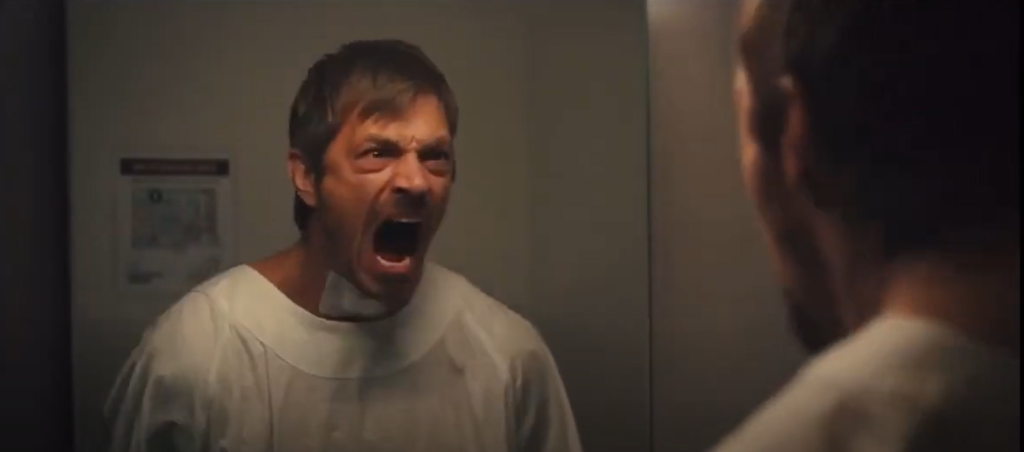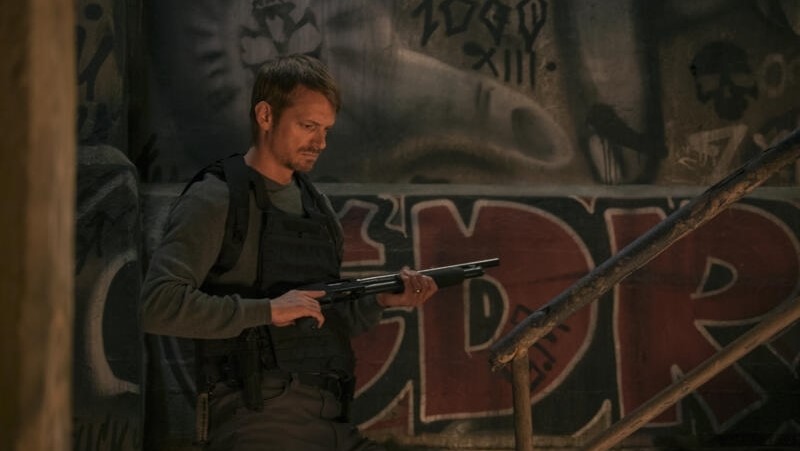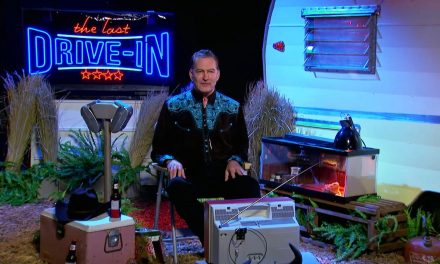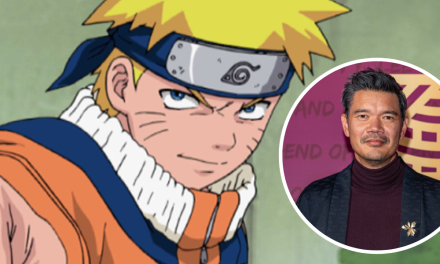It all should have been excellent. You combine some of the elements that create the greatest action movies ever: Holiday themes, John Woo, car chases, a father on a mission. Yet, Silent Night ends up disappointing. The movie relies on one of the most overused and, quite frankly, annoying tropes that modern actioners have found: the silent protagonist. Now this isn’t John Wick being a man of few words. This is actively sabotaging your movie by taking away your main character’s ability to speak.
Silent Night stars Joel Kinnaman as Brian Godlock, Catalina Sandino Moreno as his ever-patient, until she’s not, wife Saya, and Kid Cudi as Vassell, an officer investigating gang. It features a rogues gallery of endless villains featuring Harold Torres as Playa, and Yoko Hamamura as Ruiz. It’s directed by the master of action, John Woo, and features a script from Robert Archer Lynn.
The story follows a father (Kinnaman) who loses his child on Christmas Eve after a gang shooting goes wrong. Stray bullets hit his kid, and we’re shown the aftermath of the event in the opening sequence. After you watch the whole film, this opening sequence really only serves the purpose of using up some of the “suspension of disbelief” in the opening moments when Kinnaman is shot by Playa, except it’s not a kill shot. It’s in his throat. That makes him silent for the rest of the film. While it’s a challenge for Kinnaman as an actor, it’s grating to the audience.
A Mind-Numbing Narrative Choice

That choice really neuters any chance that Silent Night had at being fun or endearing because it just saps Brian of all his character. There’s enough there for you to root for him, but his character never really gets going. The movie goes to painstaking lengths in the first half of the film to show that Brian is capable and getting smarter, stronger, learning how the gangs work, etc. It does this for far longer than is necessary, and especially considering that Kinnaman already looks like an action star, showing us him lifting a kettlebell slowly, is pretty overkill.
This script is like the writer took Screenwriting 101, heard the professor say “show, don’t tell,” and took that to heart. There’s almost no dialogue in the film. The first time you hear a human voice, it’s a radio talking about inflation. So, as an audience member, you’re just not really allowed to get in tune with any of these characters or care about them; because they’re fumbling around, trying NOT to talk.
I’m about to complain about logic in an action movie. But the logic really comes back to the actual story being weak, and less about action movie logic.
Weak Villains, Weak (At Times) Protagonists
The gangs that Brian goes up against in the films seem menacing. They’re pretty good at being targets when he’s driving around or shooting, heading toward the big bad. They’re also hopped up on drugs, so that adds to the prospective challenge for our protagonist. Instead of doing any of that. Silent Night makes the most impressive adversary a random girl who’s hopped up on drugs with a machine gun. She does all the damage in the film to both of the heroes. While she’s firing, they lose all sense of logic and turn into dumb targets, popping up when she’s spraying and praying, instead of doing anything while she reloads slowly.

The other hero in the film is Kid Cudi’s Officer Vassell, who doesn’t actually involve himself in the case until Brian forces his hand. Because the movie doesn’t want anyone to talk, his character is all but a stranger to the audience. When he comes in for the save in the third act, it’s not a big moment, because there’s nothing to care about. He gets one cool moment right when he arrives to help Brian with the gangs, but other than that, he’s off to the sidelines.
The villains are all Hispanic caricatures and stereotypes that get no development at all. In a movie that works so long to develop and show us that the protagonist is capable, it doesn’t do that for the villains. The big bad hides the entire time, sending text messages to his underlings, and then when it comes for a big showdown, the movie ends it in a flat and unsatisfying way.
Is There Anything Good About Silent Night?
John Woo. John Woo is the best thing about Silent Night. The action scenes, for the most part, are exquisite. There’s a lot here that COULD have been great. Instead, it’s surrounded by baffling narrative and structural choices that neuter the action sequences. Joel Kinnaman is more than capable of the action scenes, and he does a great job showing off how much of an action star he is. He’s a tank at points, absolutely decimating people. But, once again, in some clueless scenes, he gets his ass kicked by an accountant of all people. The movie actively sabotages its main character on multiple fronts, leaving you with a performance that’s good considering the constraints, but it doesn’t really register with the audience.
There is one sequence in the third act that is breathtaking and classic Woo-style. It takes place with Brian heading up a flight of stairs and ends up as the most thrilling section of the film. It’s an extended class on how to direct action, that shows the potential of this film. It could have been so much more, but the narrative and structural choices absolutely kneecap it.
I love John Woo’s films. They’re all masterclasses in how to direct an action flick while keeping it interesting and thought-provoking for the audience. Because of the weak script and storyline constraints, Silent Night takes away all the power of Woo’s directing and action sequences, and leaves you with a film that is barely a Holiday film, and an even weaker movie overall.
Silent Night releases in theaters on December 1st.
For more Reviews, make sure to check back to That Hashtag Show.

![Silent Night – Show, Don’t Tell, To The Extreme [Review]](https://thathashtagshow.com/wp-content/uploads/2023/11/370277804_732548838274273_8900993970273582157_n-1200x640.jpg)


![The Book Of Boba Fett Episode Five – Flying Coach [Review]](https://thathashtagshow.com/wp-content/uploads/2022/01/271879913_4709239819144663_8690278329266532022_n-440x264.png)

